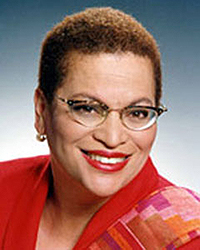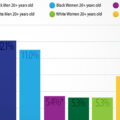

Julianne Malveaux
By Julianne Malveaux
TRICEEDNEYWIRE.COM
When the unemployment rate dropped and economic conditions improved under the leadership of President Barack Obama,45 derided the gains as “fake news.”
He suggested that the monthly Employment Situation (www.bls.gov) reports of the Bureau of Labor Statistics were inaccurate and “made up.”. These are the monthly reports that detail employment statistics, including unemployment rates. Now that 45 is in charge, he can’t crow often enough about the statistics that he described as “phony” just 18 months ago.
For the last week, we have heard 45 and his surrogates crowing that “the Black unemployment rate is lower than it has ever been.” And, with a Black unemployment rate of 6.8 percent, they are right that the rate is at its lowest since the Bureau of Labor Statistics started disaggregating data to report unemployment by race. Is this something worth crowing about? Does 45 deserve to get credit for it? The answer to both questions, from my perspective, is a resounding “no.”
First of all, the 6.8 percent unemployment rate African-Americans experienced was exactly TWICE the White unemployment rate of 3.4 percent. Suppose that White men had an unemployment rate of 6.8 percent? Would 45 and his minions be celebrating if Whites had the same employment situation as African-Americans? I think not. So, celebrating the 6.8 percent rate without speaking of the inequality it is based on is like celebrating the inequality.
Secondly, the unemployment rate is an imperfect measure of the employment situation. The employment-population ratio is a far more accurate way of measuring how fully employed a population is. It measures the percentage of people who are employed. While 69 percent of White men are employed, just 63 percent of Black men are employed (the numbers for women are closer, with African-American women actually working MORE than White women, with an employment-population ratio of 59 percent for Black women and 55 percent for White women).
The employment-population ratio and labor force participation rates show racial disparities among men that are alarming. Differences in the employment-population ratio suggest that some African-Americans have stopped looking for work because they don’t think they can find it. When the Black unemployment rate is adjusted to reflect these realities, it is closer to 10 percent than to the 6.8 percent 45 and his team are crowing out.
Furthermore, the 45th President inherited an economy that was improving. Falling unemployment rates are a result of the Obama expansion. Let’s say it again, the Obama expansion. An economic expansion will naturally move unemployment rates downward, no matter who is the President. While 45 can only legitimately claim stock market gains for the last two months, as his regressive tax bill has handsomely rewarded corporate interests, stock market gains in the first month of this year might also be considered a result of the Obama expansion.
Will 45 take credit for the stagnant wages that plague all workers, but especially African-American workers? While unemployment rates have dropped, wages have not risen by very much (less than 2 percent last year). Sure, some workers got tax bill-related bonuses, and Walmart will raise their wages for some workers to $11 an hour. Most workers are stuck making the same amount of money they made three years ago.
Does 45 take credit for income and wealth differences between African-Americans and Whites? The average White family has a $65,000 income, compared to just $39,000 for African-Americans. And the average African-American household has just $17,000 in wealth, compared to $171,000 for Whites.
When 45 crows about a 6.8 percent unemployment rate for African-Americans, he normalizes the fact that African-Americans should have a higher unemployment rate than Whites. And when he talks unemployment out of context and ignores income and wealth disparities, he is suggesting that the current conditions of African-Americans are something to celebrate.
If this president were really interested in the economic status of African-Americans, he would have produced a different tax bill, ceased his attacks on health care, and directed his secretary of education to stop attacking public education and HBCUs. But 45 isn’t interested in the economic status of African-Americans. He is interested in bragging about data he once dismissed as “phony”.
Julianne Malveaux is an author and economist. Her latest book “Are We Better Off? Race, Obama and Public Policy” is available via www.amazon.com for booking, wholesale inquiries or for more info visit www.juliannemalveaux.com.

















Leave a Comment